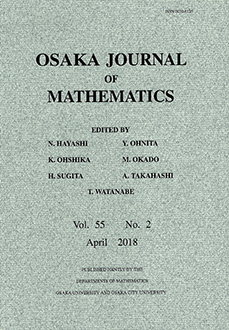Abstract
In this paper, we consider the Cauchy problem \begin{equation*} \left\{ \begin{array}{@{}ll@{}} u_{t}=(u^{m-1}u_{x})_{x}, & x \in \mathbb{R}{,}\ t>0{,}\ {-1} < m \leq 1,\\ u(x,0)=u_{0}, & x \in \mathbb{R}. \end{array} \right. \end{equation*} We will prove that: \begin{enumerate}[1)] \item $|u(x,t,m)-u(x,t,m_{0})|\to 0$ uniformly on $[-l,l]\times[\tau,T]$ as $m \to m_{0}$ for any given $l > 0$, $0<\tau<T$ and $-1<m$, $m_{0}<1$, \item $\int_{\mathbb{R}}|u(x,t,m)-u(x,t,1)|\,dx \leq 2((1-m)/m)\|u_{0}\|_{L^{1}(\mathbb{R})}$. \end{enumerate}
Citation
Jiaqing Pan. "The approximating character on nonlinearities of solutions of Cauchy problem for a singular diffusion equation." Osaka J. Math. 45 (4) 909 - 919, December 2008.
Information





